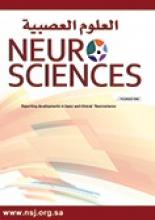Abstract
OBJECTIVE: To evaluate the socio-demographic characteristics of major depressive disorders in the State of Qatar, which has a high percentage of expatriates.
METHODS: Out of 7460 outpatient psychiatric clinic attendees at Hamad Medical Corporation, Doha, Qatar, between November 1993 through December 1998, 2483 patients met the diagnosis of depressive disorder. Prospectively, we interviewed 1114 patients who met the diagnosis of Depressive Episode and Recurrent Depressive Disorder according to International Classification of Disease-10 (major depressive disorder according to Diagnostic and Statistical Manual-IV). The data was coded and analyzed by using Statistical Package for Social Sciences under windows.
RESULTS: Thirty-three point three percent of the patients met the diagnosis of depressive disorder and those with major depressive disorder were 14.9% of the total. Of those with major depressive disorder approximately 2/3rd had a single depressive episode and one 3rd had recurrent attacks. Major depressive disorder is significantly equal in both sexes, married patients of both sexes have a significantly higher rate than others. There is a remarkable consistent rise in the frequency of recurrent depression, compared with significant decline in frequency of single depression with age. Major depressive disorder is significantly more among the unemployed. Among the employed, skilled workers have significantly higher rate of major depressive disorder than non-skilled and professionals.
CONCLUSION: In nonhomogeneous societies such as Qatar and the Arabian Gulf in general, where men outnumber women, the distribution of major depressive disorder among outpatients is inconsistent with other studies. Age, sex and occupation are the important risk factors for major depressive disorder. Marriage has no protective effect in major depressive disorder.
- Copyright: © Neurosciences
Neurosciences is an Open Access journal and articles published are distributed under the terms of the Creative Commons Attribution-NonCommercial License (CC BY-NC). Readers may copy, distribute, and display the work for non-commercial purposes with the proper citation of the original work.






